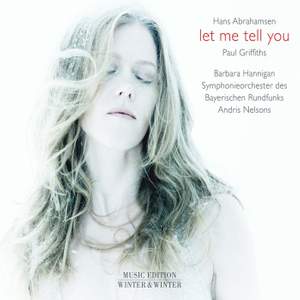Abrahamsen: Let me tell you
Barbara Hannigan (soprano)
Symphonieorchester des Bayerischen Rundfunks, Andris Nelsons
Abrahamsen expresses both the fragility and force of Griffiths's imagined Ophelia through glinting, gauze-like textures and moments of clattering tumult…Barbara Hannigan's agile, luminous voice... — More…
-
Gramophone MagazineMarch 2016Editor's Choice
-
Diapason d’Or de l’Année2016Winner - Musique Contemporaine
-
Presto Recordings of the YearFinalist 2016
CD
$19.25Downloads
What are FLAC and MP3?Contents
Abrahamsen: Let me tell you
Work length32:42
$9.00
$11.65
$15.75
- Barbara Hannigan (soprano)
- Symphonie-Orchester des Bayerischen Rundfunks
- Andris Nelsons
- Recorded: 2-3 July 2015
- Recording Venue: Herkulessaal der Residenz, Munich
Part 1: Let me tell you how it was
Track length3:50
$1.00
$1.30
$1.75
Part 1: O but memory is not one but many
Track length2:51
$1.00
$1.30
$1.75
Part 1: There was a time, I remember
Track length6:00
$1.00
$1.30
$1.75









